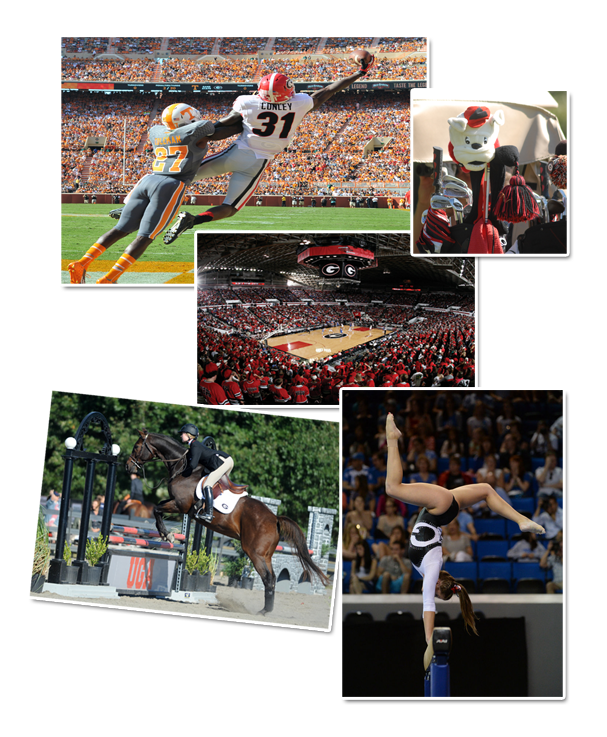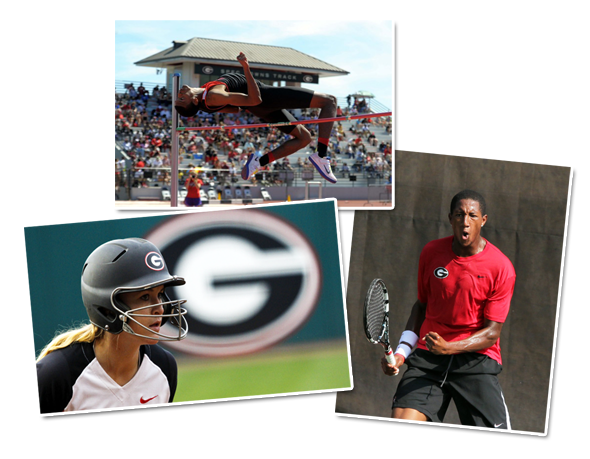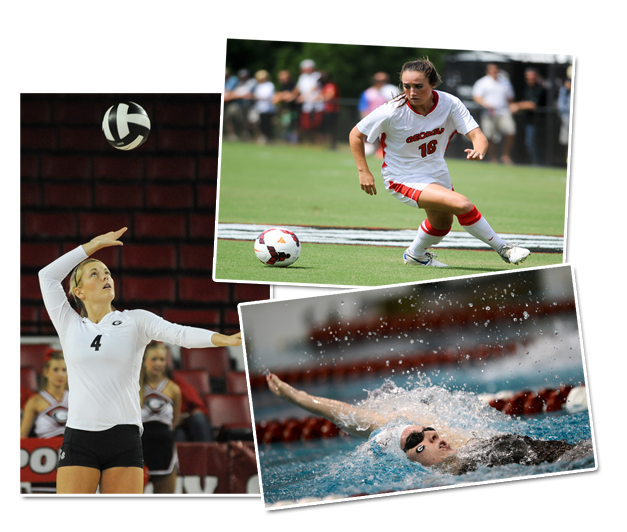 Terms to Know:
Terms to Know:
Many times the NCAA rules and regulations may seem complex and difficult to under stand. Below some of the most frequently used terms are identified and defined.
Prospective Student-Athlete (Prospect/Recruit)
A prospective student-athlete (prospect) is an individual who has either started classes in the ninth grade OR who has received any benefit from an institution or a booster.
Student-Athlete
A student-athlete is an individual who is enrolled at the University of Georgia, who also participates on a varsity sports team sponsored by the University of Georgia Athletic Association.
Recruiting
Recruiting involves any solicitation of a prospect (or family members) by an institution’s athletics staff to encourage him/her to enroll at that institution and participate in its intercollegiate athletic programs.
Extra Benefit
An extra benefit is any special arrangement by an institutional employee or a booster to provide a student-athlete, or that student-athlete’s friends or relatives, a benefit not authorized by the NCAA.
What is a Booster?
A “booster” (Representative of the Institution’s Athletics Interest) is an individual or business that is known (or should have known) by the University of Georgia Athletic Association to have participated in any of the following:
- Participated in or been a member of an organization promoting Georgia Athletics.
- Contributed financially to the UGA Athletic Association, the Bulldog Club, individual athletic programs or any other UGA Athletics or sport specific booster organization.
- Assisted in the recruitment of prospects.
- Provided NCAA impermissible benefits to enrolled student-athletes or their families.
Once identified as a booster, an individual or business retains that identity for life.
 A Booster May:
A Booster May:
- Continue contact with a prospect as long as the booster has an established relationship prior to the student being a prospect and as long as there is no attempt to recruit the prospect.
- Watch a prospect’s athletic contest, but not have contact with that prospect.
- Bring to Georgia’s attention outstanding prospects from the booster’s local area. HOWEVER, a booster may not get involved in the actual evaluation of the prospect.
- Talk to a prospect via telephone if the call is initiated by the prospect. The call cannot be initiated or arranged by UGA coaching staff members. The booster must refer any questions about Georgia’s athletic program to the Athletic Association and the booster may not encourage the prospect to attend the University of Georgia.
A Booster May Not:
- Contact a prospect or his/her parents in person, by phone, or in writing (letters, email or social media) for the purpose of recruiting the prospect. Contact may not be made with a prospect or his/her parents on or off the UGA campus.
- Approach a Georgia coach who is with a prospect. This puts the coach in an uncomfortable situation because the coach is not to introduce the booster to the prospect.
- Have contact with student-athletes at institutions other than the University of Georgia for the purpose of recruiting.
- Have face-to-face contact with a prospect or his/her family with the purpose of recruiting him/her to attend the University of Georgia.
- Mail anything to a prospect, including but not limited to newspapers, clippings, press releases, media guides, posters, game programs, schedule cards, or emails.
- Contact a prospect’s counselor, principal or coach in order to evaluate a prospect. Additionally, a booster may not pick up videotapes or transcripts of the prospect at his/her high school or junior college.
- Provide a prospect or his/her family or friends any extra benefits. A booster also may not provide any extra benefits to current student-athletes.

Institutional Control
Institutional Control of athletics is a fundamental requirement of NCAA legislation. Specifically, the NCAA constitution provides that each member institution shall be responsible for:
- Controlling its intercollegiate athletics program;
- Monitoring its programs to ensure compliance with NCAA rules;
- Ensuring that members of the Institutions staff, student athletes and other individuals or groups representing the Institution’ s athletics interest comply with all NCAA rules.
Consequences
Any individual who has engaged in conduct that is determined either by the University, the Southeastern Conference, or the NCAA to be a violation and results in the imposition of sanctions, can be subject to revocation of ticket privileges and/or disassociation from the Athletic Association for that period of time which the University, Southeastern Conference or NCAA deems appropriate.
